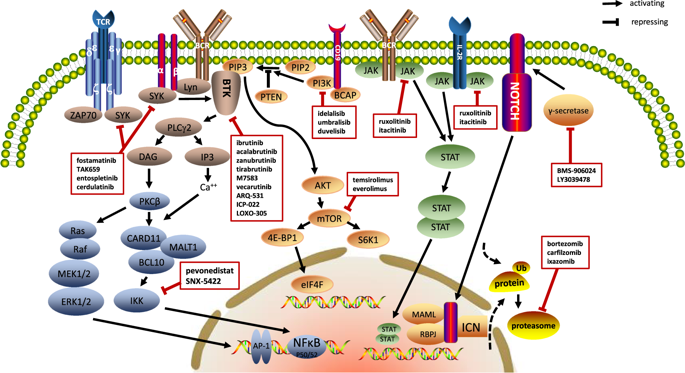当前位置:
X-MOL 学术
›
Signal Transduct. Target Ther.
›
论文详情
Our official English website, www.x-mol.net, welcomes your
feedback! (Note: you will need to create a separate account there.)
Advances in targeted therapy for malignant lymphoma.
Signal Transduction and Targeted Therapy ( IF 40.8 ) Pub Date : 2020-03-06 , DOI: 10.1038/s41392-020-0113-2 Li Wang 1, 2 , Wei Qin 1 , Yu-Jia Huo 1 , Xiao Li 1 , Qing Shi 1 , John E J Rasko 3, 4 , Anne Janin 2, 5 , Wei-Li Zhao 1, 2
Signal Transduction and Targeted Therapy ( IF 40.8 ) Pub Date : 2020-03-06 , DOI: 10.1038/s41392-020-0113-2 Li Wang 1, 2 , Wei Qin 1 , Yu-Jia Huo 1 , Xiao Li 1 , Qing Shi 1 , John E J Rasko 3, 4 , Anne Janin 2, 5 , Wei-Li Zhao 1, 2
Affiliation

|
The incidence of lymphoma has gradually increased over previous decades, and it ranks among the ten most prevalent cancers worldwide. With the development of targeted therapeutic strategies, though a subset of lymphoma patients has become curable, the treatment of refractory and relapsed diseases remains challenging. Many efforts have been made to explore new targets and to develop corresponding therapies. In addition to novel antibodies targeting surface antigens and small molecular inhibitors targeting oncogenic signaling pathways and tumor suppressors, immune checkpoint inhibitors and chimeric antigen receptor T-cells have been rapidly developed to target the tumor microenvironment. Although these targeted agents have shown great success in treating lymphoma patients, adverse events should be noted. The selection of the most suitable candidates, optimal dosage, and effective combinations warrant further investigation. In this review, we systematically outlined the advances in targeted therapy for malignant lymphoma, providing a clinical rationale for mechanism-based lymphoma treatment in the era of precision medicine.
中文翻译:

恶性淋巴瘤靶向治疗进展。
淋巴瘤的发病率在过去几十年中逐渐上升,已跻身全球十大流行癌症之列。随着靶向治疗策略的发展,尽管一部分淋巴瘤患者已经可以治愈,但难治性和复发性疾病的治疗仍然具有挑战性。人们已经做出了许多努力来探索新的靶点并开发相应的疗法。除了针对表面抗原的新型抗体和针对致癌信号通路和肿瘤抑制因子的小分子抑制剂外,针对肿瘤微环境的免疫检查点抑制剂和嵌合抗原受体T细胞也得到了迅速发展。尽管这些靶向药物在治疗淋巴瘤患者方面取得了巨大成功,但仍应注意不良事件。选择最合适的候选药物、最佳剂量和有效的组合值得进一步研究。在这篇综述中,我们系统地概述了恶性淋巴瘤靶向治疗的进展,为精准医学时代基于机制的淋巴瘤治疗提供了临床依据。
更新日期:2020-03-06
中文翻译:

恶性淋巴瘤靶向治疗进展。
淋巴瘤的发病率在过去几十年中逐渐上升,已跻身全球十大流行癌症之列。随着靶向治疗策略的发展,尽管一部分淋巴瘤患者已经可以治愈,但难治性和复发性疾病的治疗仍然具有挑战性。人们已经做出了许多努力来探索新的靶点并开发相应的疗法。除了针对表面抗原的新型抗体和针对致癌信号通路和肿瘤抑制因子的小分子抑制剂外,针对肿瘤微环境的免疫检查点抑制剂和嵌合抗原受体T细胞也得到了迅速发展。尽管这些靶向药物在治疗淋巴瘤患者方面取得了巨大成功,但仍应注意不良事件。选择最合适的候选药物、最佳剂量和有效的组合值得进一步研究。在这篇综述中,我们系统地概述了恶性淋巴瘤靶向治疗的进展,为精准医学时代基于机制的淋巴瘤治疗提供了临床依据。











































 京公网安备 11010802027423号
京公网安备 11010802027423号